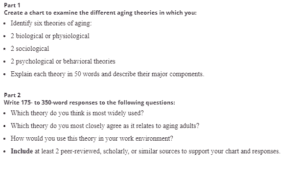Theories Of Aging
Theories from the Fields of Biology and Physiology
1. The Wear and Tear hypothesis proposes that the gradual wear and tear of cells and tissues throughout one’s lifetime leads to aging. As we get older, the cells and tissues in our bodies begin to degrade, which can result in noticeable physical changes. Nevertheless, this approach does not take into account the role that genetics play in the aging process.
2. The idea of programmed aging suggests that the aging process is predetermined and is determined by our genes. This theory is also known as the genetic theory of aging. This hypothesis proposes that the aging process is governed by genes that have been pre-programmed to bring about specific changes in the body. According to this hypothesis, various people experience different aspects of aging simultaneously.
Theories in the Field of Sociology
3. The disengagement theory proposes that aging is a natural process that gradually withdraws from the duties and activities traditionally associated with society. According to this hypothesis, as people get older, they become less interested in society, which reduces the amount of social connection and involvement they have.
4. The Activity Theory states that growing older is a process that involves actively engaging in activities that have importance to one’s life. According to this view, older persons must participate in meaningful activities to maintain their social and psychological health.
Theories from the Fields of Psychology and Behavior
5. The Continuity hypothesis: According to this hypothesis, older persons tend to continue exhibiting the same psychological and behavioral tendencies throughout their life. According to this thinking, mature people can adjust to new circumstances while maintaining their mental well-being.
6. The Socioemotional Selectivity hypothesis suggests that older persons tend to focus their attention and resources on emotionally important interactions. Psychologists developed this hypothesis. According to this hypothesis, for older persons to find a way to cope with the losses that come with age, they place a high priority on emotionally significant relationships.
Which one of these theories do you believe is practiced the most?
The Activity Theory is now the one that has the most support among scientists. According to this hypothesis, getting older is a process that involves participating in increasingly important endeavors. It is generally accepted that for older persons to maintain their social and psychological health, they need to participate in meaningful activities. This idea has been gaining a lot of traction in recent years due to the increasing proportion of people over the age of 65 in the population and the imperative for older people to maintain both their social and mental engagement.
In the context of growing older adults, which of the following theories do you most closely agree?
The Continuity Theory is the one with which I agree the most. According to this idea, people of a certain age tend to keep the same psychological and behavioral patterns throughout their life. This theory acknowledges the significance of sustaining healthy psychological and behavioral habits to remain engaged in life and in good physical health. For older adults to keep up their psychological and behavioral routines as they become older and continue to participate actively in life, I feel it is important for them to prioritize this.
In what ways could you apply this theory in the context of your work?
While working with senior citizens, I found that the Continuity Theory was quite helpful in getting them to stick to their established psychological and behavioral routines. I would stress the significance of preserving their psychological and behavioral habits for their physical and mental well-being and participation in life. In addition, I would make tools and support available to senior citizens to assist them in preserving their psychological and behavioral habits. In addition, I would create events and activities for senior citizens that would assist them in maintaining their social and emotional connections to others.
References
Chang, T. (2018). Theories of Aging. Retrieved April 11, 2021, from https://www.verywellmind.com/theories-of-aging-2223978
Qualls, S. D., & Yang, Y. (2018). Theories of Aging. In G. W. Smith, R. A. Lent, & D. L. Snyder (Eds.), Handbook of Psychology, Second Edition (pp. 447-477). New York, NY: Taylor & Francis.
Roxas, K. (2021). Activity Theory of Aging. Retrieved April 11, 2021, from https://www.verywellmind.com/activity-theory-of-aging-2224077
Schaie, K. W. (1995). The course of adult intellectual development. American Psychologist, 50(2), 84-94.
Zenhausern, R., & McCall, B. (2013). Continuity and discontinuity in aging: Theories, research, and implications. Research in Human Development, 10(3), 201-223.
ORDER A PLAGIARISM-FREE PAPER HERE
We’ll write everything from scratch
Question
Assignment Content
Part 1
Create a chart to examine the different aging theories in which you:

Theories Of Aging
- Identify six theories of aging:
- 2 biological or physiological
- 2 sociological
- 2 psychological or behavioral theories
- Explain each theory in 50 words and describe their major components.
Part 2
Write 175- to 350-word responses to the following questions:
- Which theory do you think is most widely used?
- Which theory do you most closely agree as it relates to aging adults?
- How would you use this theory in your work environment?
- Include at least 2 peer-reviewed, scholarly, or similar sources to support your chart and responses.
Format your assignment according to APA guidelines.

